
Freshfel Europe Headlines – Edition 3, 2020
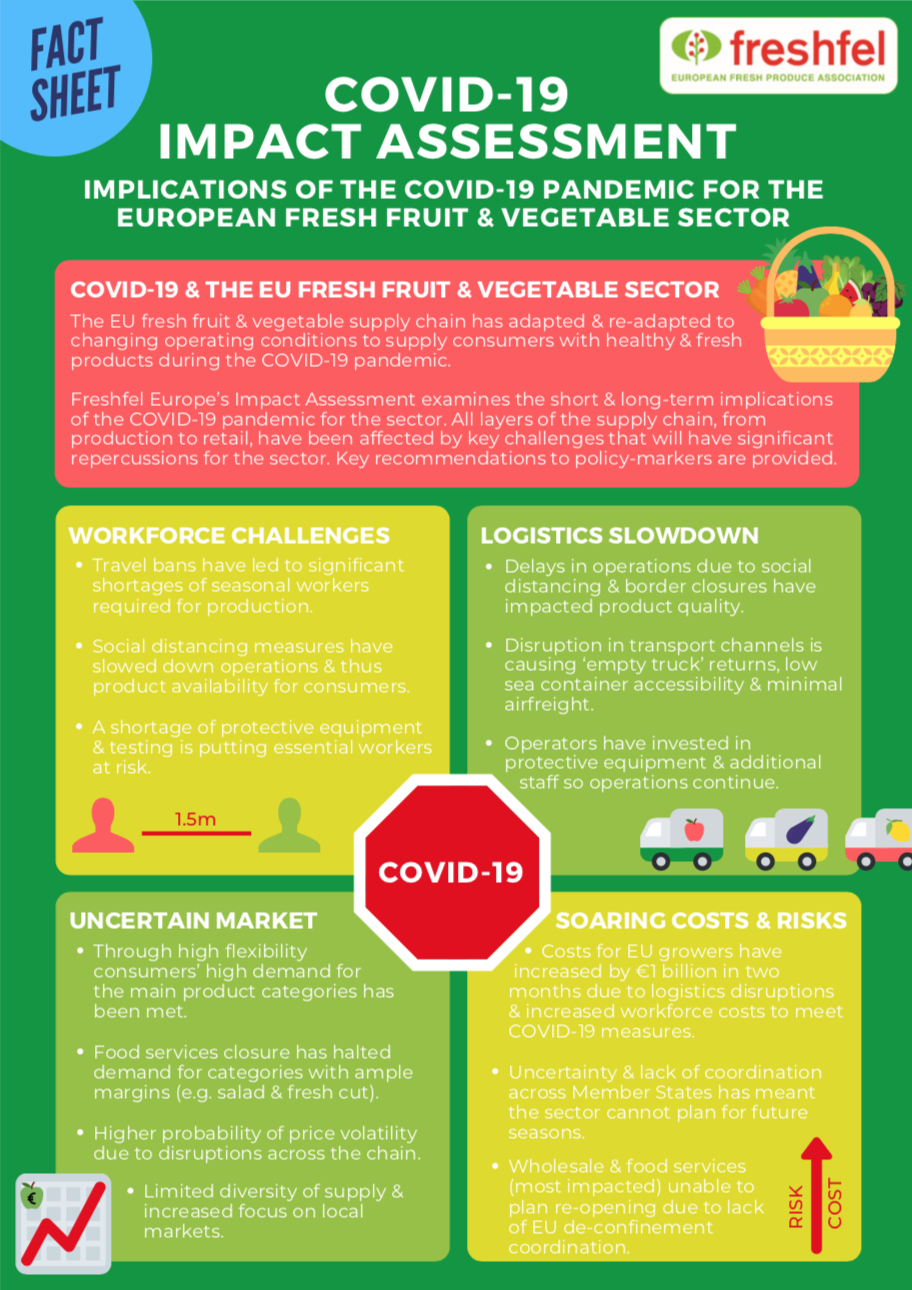
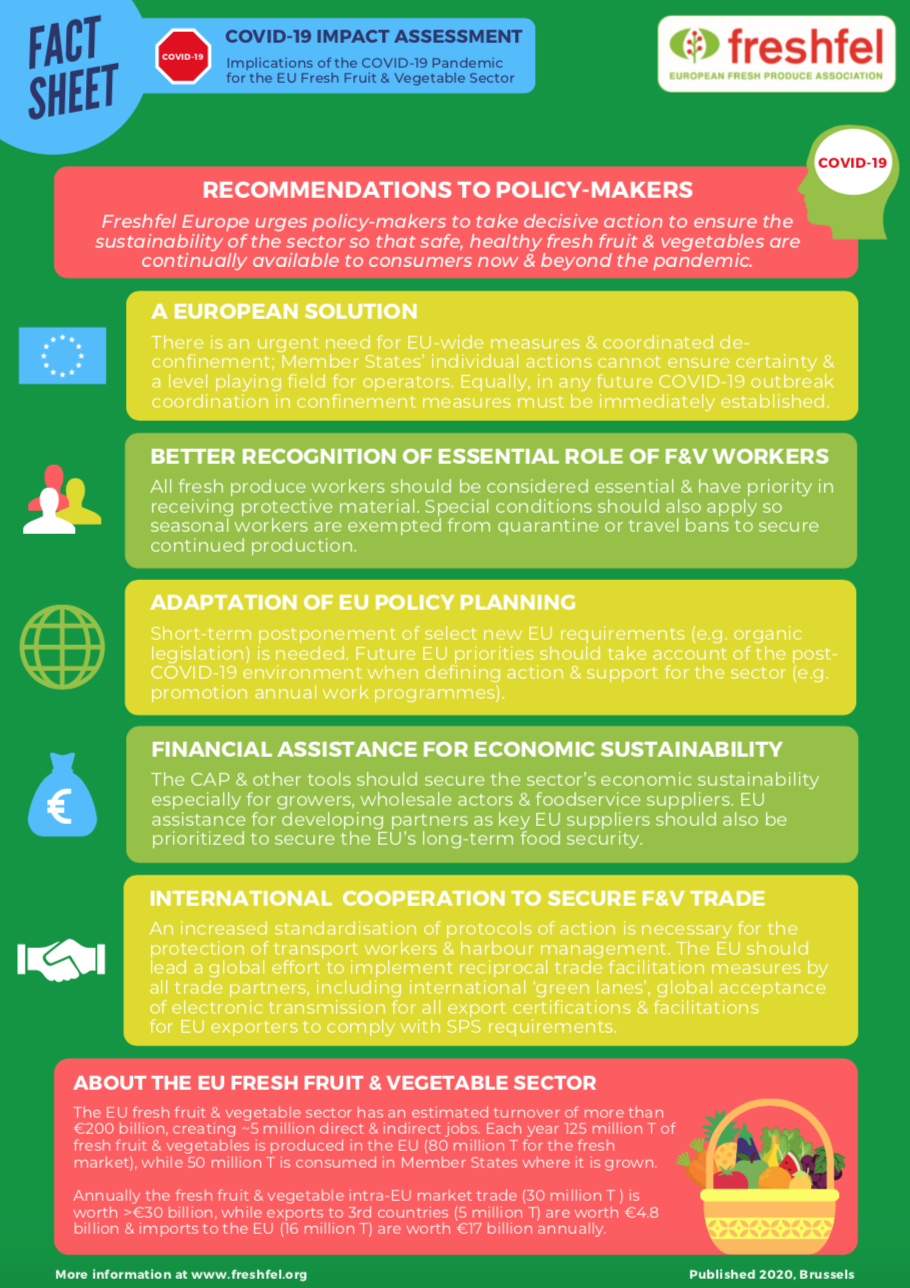
Freshfel Europe leads the voice of the fruit and vegetable sector amid the COVID-19 pandemic
From the very start of the COVID-19 pandemic Freshfel Europe has taken the lead in the representation of the fresh fruit and vegetable sector in addressing with authorities the various challenges with which the sector has been confronted. While fruit and vegetables were considered as essential goods from the very beginning, the on-going availability of fresh produce on supermarket shelves was however not granted under business as usual conditions. Under the lead of the Freshfel Europe Board, the Association has closely monitored the situation across the supply chain. This has allowed Freshfel Europe to fully measure the impact of the crisis on matters such as accessibility and mobility of (seasonal) workers, implementation of protective measures and its operational consequences for competitiveness, logistics hurdles, and identifying market trends and new requirements from consumers. Moreover, through this exercise, the cost of the crisis for the sector, totaling almost €1 billion for the first two months, was calculated by Freshfel Europe and other side effects were also identified. This included among others policy flexibility needed in CMO, challenges for promotion programmes and new organic regulation implementation, challenges for trade, and communication with consumers.
Throughout the crisis the Freshfel Europe Secretariat has continued to engage with its members, EU institutions, media outlets across Europe and as well as with several international organizations such as OECD, UNECE, World Bank and FAO. While not all issues were fully solved, several achievements were reached for the benefit of the sector including the publication by the European Commission of EU guidance on mobility of goods under green lanes at intra-EU borders, EU guidelines for mobility for seasonal workers in the Single Market and from third countries, increased flexibility of several policies in regards to deadlines for CMO and promotion policies, postponement of the entry into force of the organic legislation and trade facilitation, thanks to the acceptance of digitalized or scanned certifications in the EU for the coming months.
As Europe is progressively moving out of the peak of the crisis, Freshfel Europe will continue to monitor the situation, observe changes in business practices and in consume attitudes and expectations. In the coming months the sector will need to build on the positive image that fresh fruit and vegetables achieved during the crisis to further stimulate the consumption of fresh produce in the long-term.
Freshfel Europe’s COVID-19 activities are further described on Freshfel Europe’s dedicated COVID-19 webpage.
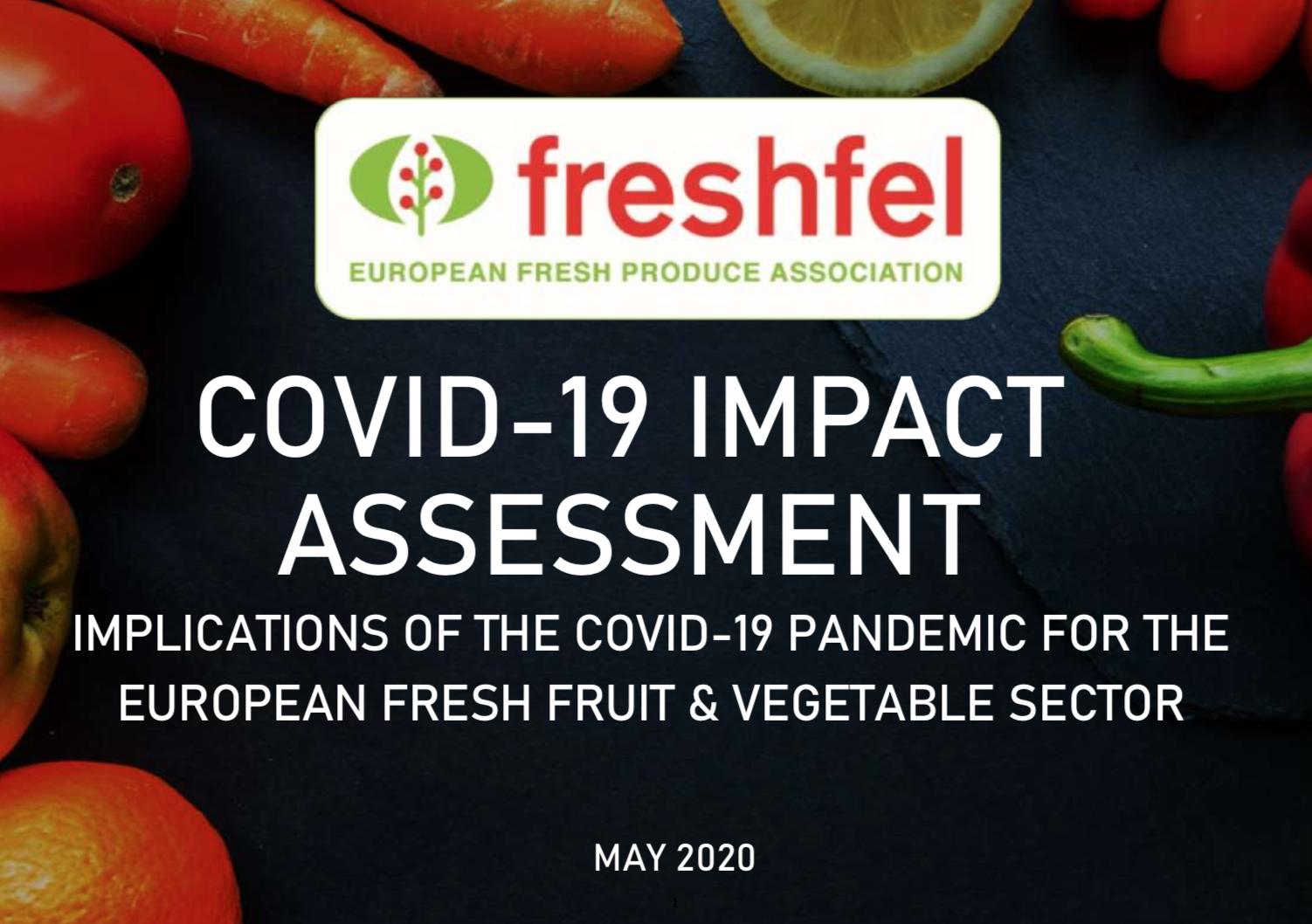
Freshfel Europe shares trade aspects of COVID-19 crisis with DG TRADE SPS Market Access Committee
On the occasion of the DG TRADE’s SPS Market Access Committee, Freshfel Europe presented the outcome of its Impact Assessment of the effects of COVID-19 on the sector focusing in particular on the trade implications for fresh produce including intra-EU trade and import and export trade. International trade has been affected by the COVID-19 pandemic due to the slowdown of operations to secure the local assortment and also given several uncertainties on market access for EU exports. Freshfel Europe successfully addressed several challenges on border controls and COVID-19 certifications for European exports with DG TRADE. Concerning customs, organic and phytosanitary certification, Freshfel Europe welcomed the progress made towards further digitalization of operations in COVID-19 times as well as the new flexibility granted for the presentation of original documents. The momentum should be kept to have these achievements set as future common practice, moving into full paperless certification transmission in trading operations. The COVID-19 pandemic has confirmed the sector and public authorities’ readiness for this transition. Freshfel Europe is also urging third countries to grant more flexibility in protocol conditions to allow EU exports to resume despite the crisis, particularly when it comes to requirements for inspectors from third countries, such as pre-clearance as the current situation makes international travel very challenging.
Freshfel Europe’s COVID-19 Impact Assessment, along with its accompanying Fact Sheet, is available to download from the Freshfel Europe website here.

Freshfel Europe calls for flexibility of rules for promotion policy to cope with the consequences of the COVID-19 pandemic
At the beginning of the pandemic Freshfel Europe called for adjustments to the European promotion policy and clarification of rules to cope with the consequences of COVID-19. Working from home, social distancing rules imposed during confinement, the cancellation of several international trade shows for fresh produce and the limitation of promotion at POS have all been aspects hindering the successful completion of activities under the European Commission’s promotion programmes. Consequently, Freshfel Europe welcomed the postponement of the date for new applications under the 2020 call. This new date in early June is assisting sector representatives mainly working from home to better prepare new applications. For the currently running programmes a scheme was put in place for the cancellation or postponement of activities planned in projects covering the year 2020, which Freshfel Europe also welcomed. Some pending questions are still to be clarified with the Commission services, in particular the need to postpone some activities beyond the termination of the Grant Agreement period to secure a full use of allocated budgets in the most efficient manner. Freshfel Europe warmly welcomes the fluid cooperation of DG AGRI and CHAFEA on these matters.
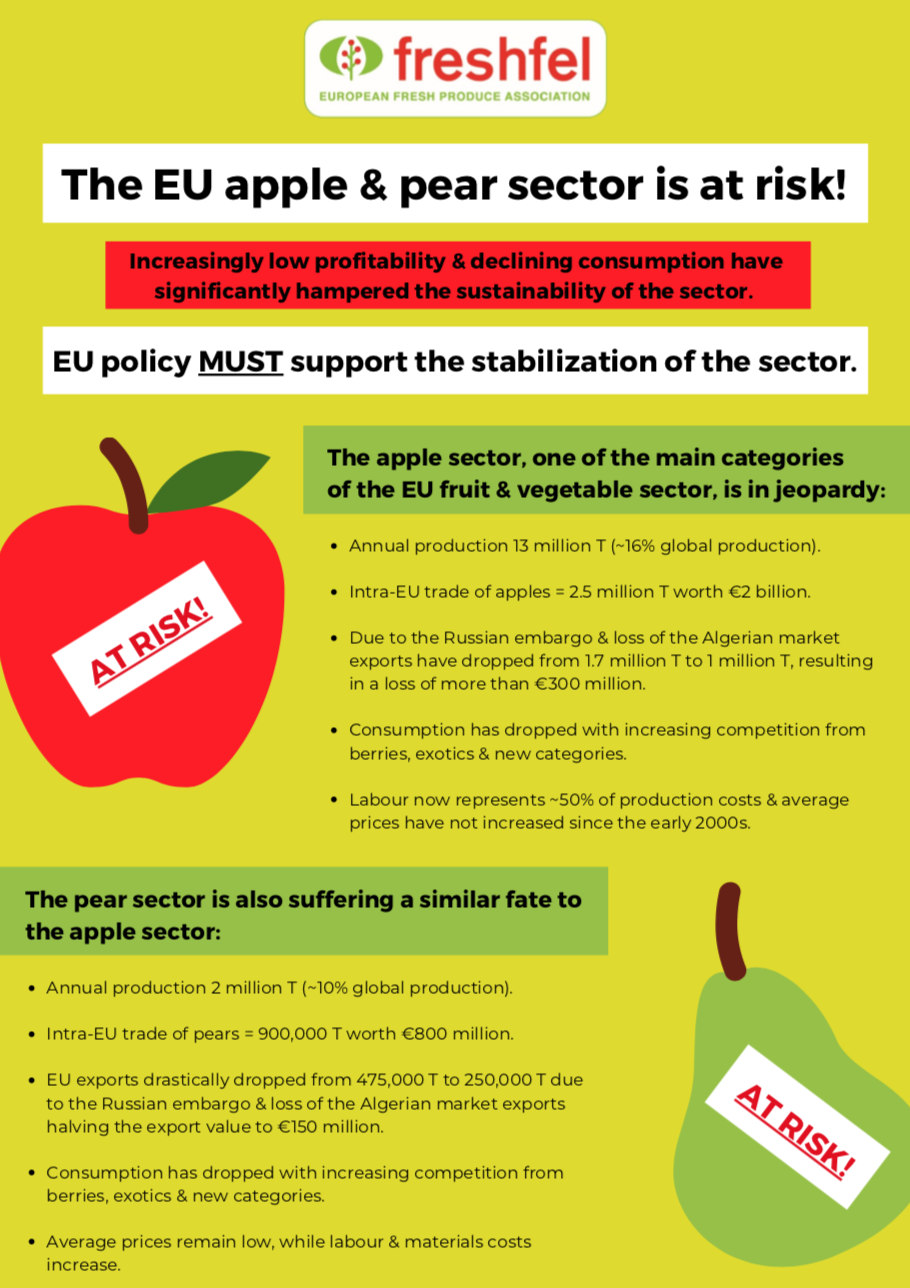
Freshfel Europe unveils outlook position paper for the European apple and pear sector at Market Observatory
While apples and pears have been in in strong demand during the COVID-19 crisis, this sector continues to be confronted with several challenges. This motivated Freshfel Europe and its members in the apple and pear segment to review the state of play and its outlook in a position paper presented at the EU apple and pear Market Observatory on 15 May 2020. The overall decrease of fresh produce consumption, the increased competition for apples and pears among the fresh produce category with other products such as growing segments, such as berries and exotics, are points of concern for apple and pear growers. Besides this, EU production is confronted with severe up and down production output given climatic havocs, but the overall EU orchard potential is currently exceeding market demand. This situation is further aggravated by the ‘subsidized’ growth of production in the EU neighborhood combined with the ongoing consequences of embargoes such as in Russia and Algeria and the slow opening of new markets which once open also require adaptations to offer and meet quality expectations of these new markets. Finally, the sector urgently needs to secure a comprehensive production toolbox to cope with climatic change and increase plant health pressures. More research and innovation is needed to address these challenges as well. Freshfel Europe calls for support of authorities to address the difficulties to better balance the market.
During the European Commission Market Observatory meeting, Freshfel Europe in cooperation with WAPA also presented the latest apple and pear market and stocks developments for the Northern Hemisphere. Freshfel Europe and WAPA also reflected on the Southern Hemisphere production and export trends for the 2020 season. The presentations made during the meetings are available here.

Freshfel Europe analysing Farm to Fork Strategy and EU Biodiversity Strategy to 2030 on sector implications
Freshfel Europe welcomed the much-anticipated release of the European Commission’s Farm to Fork Strategy and EU Biodiversity Strategy to 2030 on the 20 May 2020. Regulatory and non-regulatory issues outlined in both strategies are set to shape the future of the fresh fruit and vegetable sector. Areas of importance for the sector will most certainly be new pesticide and fertilizer reduction targets, organic farming facilitation, setting of nutrient profiles, revision of food contact materials and marketing standards legislation, harmonized mandatory front-of-pack nutrition labelling, a new sustainable food labelling framework and Green Alliances with trading partners among others. On the day of the publication Freshfel Europe sent a preliminary analysis to its members identifying the most significant initiatives for the sector and will release an official response in the coming days.

Freshfel Europe requests the European Commission to postpone the implementation of new European Organic Policy
Regulation (EU) 2018/848 on organic production and labeling of organic products will enter into force on 1 January 2021 and will overhaul the entire European organic policy. While Freshfel Europe recognizes the importance of this Regulation given the changing nature of this evolving sector, the Association has concerns regarding the proper implementation of the Regulation on 1st January 2021 in the midst of the COVID-19 outbreak. The new regulation on organic policy is designed to ensure fair competition for farmers whilst preventing fraud and maintaining consumer trust in the organic sector. This could be fully achieved only if there is enough time to adapt to these legislative requirements after they are published in the Official Journal of the EU. Consequently, for a successful start of the new regulation, growers, traders and retailers of organic produce, for product either originating in the EU or in non-EU countries, will need sufficient time to prepared for the new rules. Within the very disruptive COVID-19 environment for the fresh produce supply chain, the fruit and vegetables sector will have serious challenges and constrains to adjust very shortly to the new organic rules.
Freshfel Europe sent a letter to the Commissioner for Agriculture and Rural Development Mr Wojciechowski requesting the European Union to postpone the implementation of the organic legislation by one year. It is to be noted that the European Parliament has also requested the European Commission to delay the implementation of the Organic Regulation. While the EU Member States support such postponement, further validation also needs to be provided by the hierarchy of the European Commission as well as the European Parliament and the Council. The College of the Commissioners has recently had a discussion on this matter and the outcome will be presented to the members of Freshfel Europe in the upcoming week.

Freshfel Europe highlights dedication of sector in moving towards more sustainable fuel system in contribution to EU Maritime Shipping Consultation
Freshfel Europe has currently been strengthening its attention on matters of transportation and carbon footprint. Freshfel Europe Director Trade Policy Nelli Hajdu has been working intensively with Freshfel Europe members to submit a response to the European Commissions public consultation on how to better incentivise switching to alternative fuel methods for maritime shipping and potential impacts on the fresh produce sector. Fresh fruit exporters and importers with ownership on own fleets are currently reflecting on more sustainable methods of shipping transport. The response further reminded the European Commission that there is currently a lack of incentive regarding the regulatory structure and financial means to encourage in particular SME traders to take risky investments in changing fuel methods.

Draft Single-Use Plastics Directive Guidelines commented upon by Freshfel Europe
In early April Freshfel Europe Policy Advisor Nicola Pisano participated in the European Commission webinar on guidance on ‘Identifying and Describing the Products Covered by the Single-Use Plastics Directive’ ((EU) 2019/904) in the context of the ‘Study to support the development of implementing acts and guidance under the Directive on the reduction of the impact of certain plastic products on the environment’. Following the webinar, Freshfel Europe provided the European Commission with extensive feedback on the draft guidance document for Member States in relation to fresh fruit and vegetable packaging covered by Directive (EU) 2019/904. This was compiled via consultation with Freshfel Europe members to ensure that the guidelines reflect operating conditions and sector specifications to enhance the guidelines’ interpretability.

Freshfel Europe begins consultation process with the European Commission on the Packaging and Packaging Waste Directive
During the last week of May Freshfel Europe Policy Advisor Nicola Pisano participated in two webinars regarding the assessment of options for reinforcing the Packaging and Packaging Waste Directive’s essential requirements and other measures to reduce the generation of packaging and packaging waste. The first webinar held on 26 May 2020 involved a presentation of the assessment process of the Directive by the European Commission and explanation of the initial background assessment by the European Commission’s subcontracted agency who is conducting the study. Then on the 28 May 2020, Ms. Pisano participated in an interactive workshop on identifying packaging waste prevention measures and their impacts along with other EU and Member State-level stakeholders. As many of the fresh fruit and vegetable sector’s packaging products will be affected by any revision of the Directive, including fresh produce labels, transport packaging as well as general product packaging, throughout 2020 and into 2021 Freshfel Europe will continue to partake in European Commission’s consultation process and closely follow developments of this legislation.

Freshfel Europe discusses fruit and vegetable sticker regulation with European Commission
Over the last year and half Freshfel Europe has been following developments in the regulation of the use of stickers on fresh fruit and vegetables. While currently no EU-wide regulation exists for their use on fresh produce, a number of Member States have adopted national legislation restricting their use. These legislations will begin to come into force from the beginning of next year. Freshfel Europe Policy Advisor Nicola Pisano and Freshfel Europe General Delegate Philippe Binard met with European Commission DG Environment officials to discuss current sticker use by the sector, future implications of current Member State legislation as well as potential EU-wide legislation. Freshfel Europe and its members will continue to work closely with the European Commission on this subject.

Freshfel Europe participates in IPPC ePhyto project call with EU TRACES team and government representatives to discuss progress
As Freshfel Europe is a member of the Industry Advisory Group of the IPPC ePhyto project in April 2020 it participated in an update call with the ePhyto steering committee, which is comprised of governmental representatives from many of the participating countries as well as the European Commission’s team responsible for TRACES. The call was dedicated to discussing the progress of the project, including Argentina/Chile– U.S. already successfully exchanging phytosanitary certificates, and the connection of TRACES to the Hub-System as well as current challenges. The project is gaining more and more speed with many countries joining the hub. Despite this, industry case studies are missing due to document bottlenecks. Freshfel Europe is currently actively engaging in the initiation of fresh fruit case studies as perishable trade will need swift operations and fluent customs procedures. An update call together with the new Deputy Director General of FAO, Ms. Beth Bechdol in the first week of June 2020 will seek further alliance building for the project as the COVID-19 pandemic has shown once more how essential electronic certification can contribute to trade facilitation for fresh products in adverse circumstances.

Freshfel Europe participates in EU public consultation towards a future EU Generalised Scheme of Preferences (GSP)
Freshfel Europe submitted a contribution to the EU Online Public Consultation on a new Regulation establishing the European Union’s Generalised Scheme of Preferences (GSP). In its position paper, Freshfel Europe welcomed the overall positive effect the GSP scheme has had for developing countries’ exports to the EU, which results in more diversity and availability of affordable, healthy fresh produce for European consumers. Moreover, the position indicates the need to complement the GSP preferential system with other measures to enable effective market access to the EU for least developed countries, for instance, by reinforcing assistance to help them comply with EU standards in food quality and safety. In turn, Freshfel Europe also supports the need for the new regulation to take into account potential concerns of EU producers should market disruptions be felt in relation to GSP-covered imports.

Freshfel Europe participates in webinar on agribusiness in African countries during COVID-19
Freshfel Europe’s Director Trade Policy Nelli Hajdu participated as a panellist in the webinar ‘Adopting to the New Normal in Agribusiness’, which discussed the agricultural production and trading situation in Kenya with respect to the COVID-19 pandemic. The webinar was organised by the Kenya Fresh Produce Consortium, who has been strongly engaging over the past weeks in securing the supply chain within the country and for exports to Europe. Freshfel Europe was invited to give an overview of the COVID-19 situation in the EU regarding market developments in the fresh produce sector and to explain the current market conditions. The meeting concluded that many market challenges (logistics, workers) arise from the same source and there will be need for further monitoring of the supply situation of fresh produce in the upcoming months to avoid shortages.
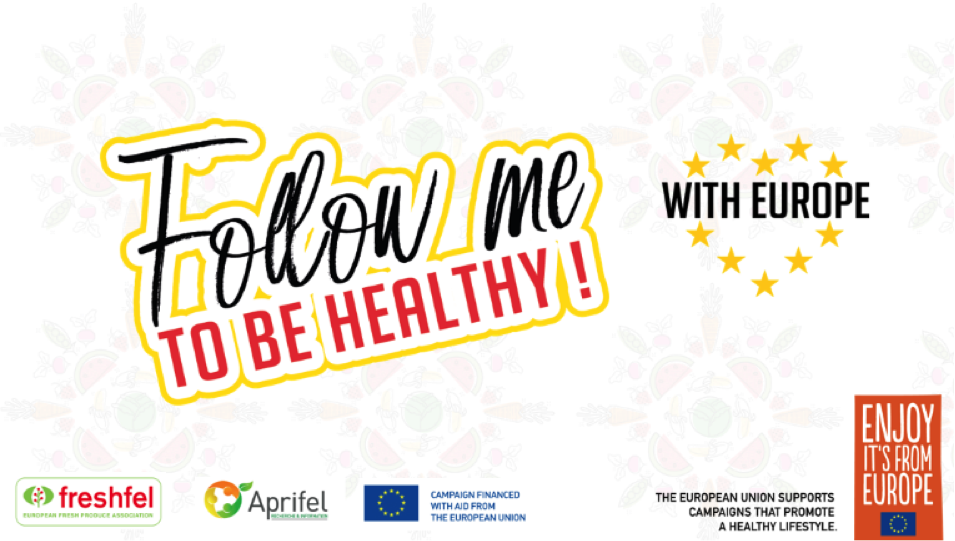
Follow me to be Healthy with Europe: One year into the #400gChallenge
The objective of the EU-funded campaign Follow me to be Healthy with Europe is to promote the daily consumption of at least 400g of fresh fruit and vegetables among young people in Europe. The programme, which is coordinated by Freshfel Europe with Aprifel as a partner, is about to celebrate its first anniversary. Since its inception Follow me to be Healthy with Europe has:
- Reached 1.1 million people through its videos, infographics, health tips, and testimonials;
- Brought together 20 influencers to promote its message;
- Been covered by 41 articles;
- Interacted with 32,000 people through social media and three different events;
- Generated 831,089 video views;
- Encouraged its participants to increase their consumption of fruit and vegetables;
- Helped them learn how to consume the right amount of fruit and vegetables daily and informed them about their health benefits.
Over the last few months, the campaign has been adapted to the new consumption environment of COVID-19 as it has focused on the health benefits of maintaining a diet rich in fruit and vegetables throughout lockdown. For instance, the latest video presents a recipe for a healthy dip for the popular ‘virtual-aperitifs’. You can join the #400gChallenge today by following the campaign on Facebook, Twitter, Instagram, and visiting the official website of the campaign.
